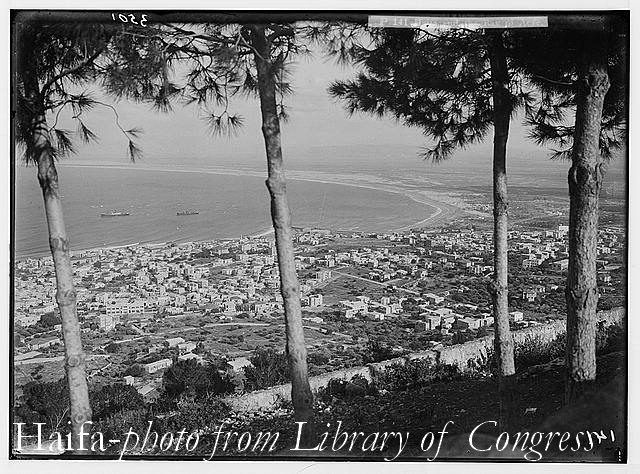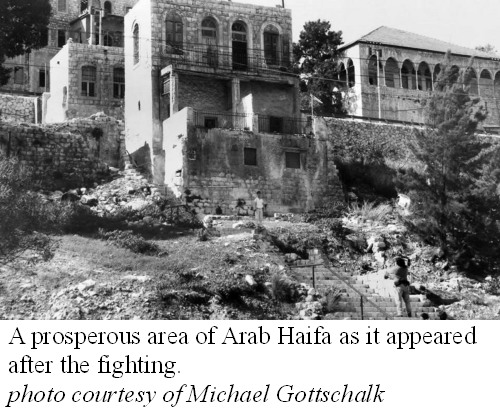Pages in Section 14

The Evacuation of Haifa
ii. Evacuation - Hebron
iii. Bassa
iv. Safad
v. Tiberias
vi. Haifa
vii. Jaffa?
viii The Last Day
Stand down
Next - Old Comrades and New Ventures
 At the beginning of 1948, Haifa,designated by the UN to be part of the Jewish State, was arguably the most beautiful city in Palestine. It was also the most prosperous. With its huge industrial complex along the bay, a massive oil refinery,the second largest commercial port on the Mediterranean and busy railway workshops, 1t was easy to turn a blind eye to the shanty town off the Nazareth Road, inhabited by seasonal migrant workers from the Hauran and Palestinian Arabs evicted from lands where they had cultivated their olive trees.
At the beginning of 1948, Haifa,designated by the UN to be part of the Jewish State, was arguably the most beautiful city in Palestine. It was also the most prosperous. With its huge industrial complex along the bay, a massive oil refinery,the second largest commercial port on the Mediterranean and busy railway workshops, 1t was easy to turn a blind eye to the shanty town off the Nazareth Road, inhabited by seasonal migrant workers from the Hauran and Palestinian Arabs evicted from lands where they had cultivated their olive trees.
In the main town, the Jewish areas were Hadar HaCarmel and Neve Sha'anan; while Khalisa and Wadi Nisnas were predominantly Palestinian Arab, although, as in Jerusalem, many Jews lived in properties owned by Arabs.
After the end of WW 2 and 1948, the number of Jews living in Haifa had increased until there were more Jews than Arabs living in the city.
It was the only major town where Arabs and Jews collaborated successfully in local government. Arabs and Jews also worked side by side in both the oil refinery and the port so the British had originally hoped that Haifa, would keep itself apart from the conflict raging over the rest of Palestine. The first sighn that all was not well occured with the oil refinery massacre. neverheless until 21st April 1948 the police of Haifa Operational Patrol were proud of the fact that no civilians dared carry guns publicly anywhere in Haifa, something that could not be said for most of Palestine.
However, control of Haifa was a critical objective in the war between Arabs and Jews during the last days of the mandate. Since it was also the designated location where British Palestine police and army personnel were to congregate before leaving Palestine, the British needed to keep at least the port area free from communal violence until the mandate ended.
To that end. Colonel Conquest, head of Haifa's Criminal CID made a "gentleman's agreement" with Abba Hushi, secretary of the Haifa Workers Council, that Hushi would inform him of any Zionist attempt to sabotage British shipping in Haifa harbor. In return, Conquest promised Hushi that he would be allowed to retain control of Haifa when the British left.
In late February 1948, Abba Hushi and Harry Beilin, the Jewish Agency officer liaising with the British army, met with General Stockwell in Haifa and placed a deal before him.
If the British handed Haifa over to Jewish Control before the mandate ended , he could avoid a confrontation between the Haganah and the British army. Stockwell asked for time to consult his superiors.
On 18 April,the day Tiberias fell to Haganah, Stockwell informed Hushi and Beilin that, General Sir Gordon McMillan, GOC all British troops in Palestine, had agreed to accept their offer and would provide boats and lorries to evacuate the Arabs. Stockwell even made a wager with Hushi of a bottle of whiskey that he couldn't capture all Haifa in less than a week.
On 21st April all British Forces in Haifa, including HOP were ordered to remain inside the port area until further notice.
 At 10:30 am on 21st April the Carmeli Brigade of the Haganah were ordered into action by Mordechai Maklef. The Battle for Haifa raged for three days.
At 10:30 am on 21st April the Carmeli Brigade of the Haganah were ordered into action by Mordechai Maklef. The Battle for Haifa raged for three days.
From the confines of their billet in the Trade School, frustrated British Police could see the fighting and hear the noise of mortars, machine guns and bombs to say nothing of the screams of the wounded and dying. Haganah troops were shooting anyone they found in the open. Many police left the port area against orders to rescue frightened women and children attempting to escape and in doing so a number lost their own lives.
The Carmeli Brigade captured all Haifa on April 23rd.
Stockwell lost the wager,
According to B/Sergeant Eric Howard, because of this deal by the British Army with Haganah, 200 of the 450 members of British Section of the Palestine Police , who had volunteered to stay on as the rear party, resigned and were evacuated with the rest of the British. He says he only stayed on because he had volunteered to see the job through.
By this time most of the Muslim population had fled through the British-controlled port although according to the British district superintendent of police, the Jews made every effort to persuade the Arab populace to stay and carry on with their normal lives.
After the battle ended, the Senior Police Officer of Haifa District, Superintendent 'Paddy' Meehan, called a meeting of the local Jewish officials and heads of Haganah. He told them he had been out-ranked when the decision was made to cease normal patrolling but, after what he had seen, the military could get stuffed. If Haganah didn't get the bodies removed, rubble cleared from the streets , water supplies and electricity turned on within the time limit he set, he would call out every HOP team with orders to shoot every Jew in sight carrying arms. He also told them normal patrolling would be resumed and there had better not be any more police casualties.
When the rear party left at the end of June 1948 only 2,000 Christians and 1,300 Muslims out of the original estimated 64,000 Arabs still lived in the city.
Many ex-British Palestine police, especially those who had served in Haifa, felt strongly for the rest of their lives, that the British army had betrayed the Arabs.
However, a British intelligence report, summing up the week's events, claimed that most Arab residents had left because one Arab notable, Victor Khayak, had spread rumours that Haganah would take Haifa residents hostage in the event of future attacks on other Jewish areas. Benny Morris claims that the Arab leaders were angry with Victor Khayak when he put out radio broadcasts from Ramallah and Damascus urging Haifa residents to stay put.